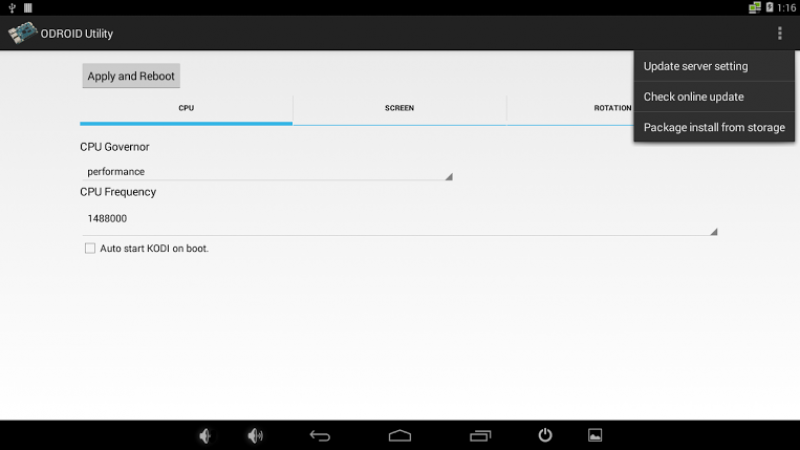Table of Contents
Release Note of Android (v3.6)
Summary
| Release Date | May/22/2017 KST |
| Release Type | Regular release |
| Release Files | Self-installation Image (MD5SUM: 8d8bab42374a1782077a6494d8ef0701) |
Since Android 5.1 on C1 series has some issues, we release a Kitkat (Android 4.4.4) update again.
You must format SD Card or eMMC installed 4.4.4 v3.2 version and write selfinstall image because partition table was updated for MTP service.
New updates
- Fixed WPA-supplicant issue to show the WiFi module 3 signal strength icon correctly. Forum Thread
- Fix USB Audio DAC volume control issue.https://forum.odroid.com/viewtopic.php?f=113&t=26981
- Added a few requested USB-Multitouch VID/PID. http://forum.odroid.com/viewtopic.php?f=51&t=15495
/* SAMSUNG HDMI capacitive Screen */ #define USB_VENDOR_ID_SAMSUNG_2619 0x2619 #define USB_DEVICE_ID_LH65DMEXTBC 0x5620 /* SAMSUNG HDMI capacitive Screen */ #define USB_VENDOR_ID_SAMSUNG_04E8 0x04E8 #define USB_DEVICE_ID_LH55PMFXTBC 0x20A6 /* Planar PS5562T HDMI capacitive Screen */ #define USB_VENDOR_ID_PLANAR_2309 0x2309 #define USB_DEVICE_ID_PLANAR_PS5562T_TOUCH 0x1005 /* CJTouch HDMI capacitive Screen */ #define USB_VENDOR_ID_CJTOUCH 0x24b8 #define USB_DEVICE_ID_CCA_UL01_DM 0x0001 /* NEC HDMI capacitive Screen */ #define USB_VENDOR_ID_NEC_1926 0x1926 #define USB_DEVICE_ID_V652_TM 0x036A
Update Instruction
Self Installation
You can install the release to your MicroSD or eMMC with the tool dd in Linux or Win32DiskImager in Windows. Please refer this for more detail.
We have been reported that some of users can not watch Android logo on their TV while installing even though installation is proceeded. So please wait for 5 minutes since power on and red and blue LED is on. If blue led is started blinking then installation is proceeding, ODROID-C1 will reboot when finished.
Upgrade Installation
Since Android release 2.0, we provide you update package which can upgrade your device without rewrite your SD card or eMMC. This package can be downloaded and upgrade on ODROID Utility.

- Update server setting
- You can set your own update server and path where you upload your custom update package. Ordinary users does not need to run this and change the detail, it is already set with Hardkernel official download server for ODROID-C1.
- Check online update
- This will start to check latest update from Hardkernel official download server and start to download and install if new version is discovered. Your ODROID-C1 device must be connected through the network.
- Package install from storage
- This will help you to install the official upgrade package downloaded manually or custom update package. You can store a update file to external storage and select it to install.
Fastboot Update
Your can update the release by fastboot if you have MicroSD or eMMC already Android installed. If you have USB-Serial kit, you can enter to Fastboot mode when you execute the command fastboot on U-boot command line. Or if you run execute reboot fastboot from Android shell command line, your ODROID-C1 will reboot and get into fastboot mode immediately. You can check if your ODROID-C1 is attached via USB with the command fastboot devices in your desktop.
$ sudo fastboot flash bootloader u-boot.bin $ sudo fastboot flash dtb meson8b_odroidc.dtb $ sudo fastboot flash boot kernel $ sudo fastboot flash recovery recovery.img $ sudo fastboot flash logo hardkernel-720.bmp $ sudo fastboot flash system rootsystem.img $ sudo fastboot flash userdata userdata.img $ sudo fastboot flash cache cache.img $ sudo fastboot reboot
How to checkout
You can checkout Android source tree, please refer this page for more detail. Please note, Android source tree is uploading and would be completed in 1-2 days.
Android
$ mkdir odroid-c1 $ cd odroid-c1 $ repo init -u https://github.com/hardkernel/android.git -b s805_4.4.4_master $ repo sync $ repo start s805_4.4.4_master --all
ODROID Utility
packages/apps/Utility
Reference boot.ini
- boot.ini
ODROIDC-UBOOT-CONFIG # Resolution Configuration # 'hdmimode' must be one of below to configure display resolution within # supported by your TV or monitor. # Symbol | Resolution # --------------------+------------- # "vga" | 640x480 # "480p" | 720x480 # "576p" | 720x576 # "800x480p60hz" | 800x480 # "480x800p60hz" | 480x800 # "800x600p60hz" | 800x600 # "1024x600p60hz" | 1024x600 # "1024x768p60hz" | 1024x768 # "1080i50hz" | 1080I@50Hz # "1080p24hz" | 1080P@24Hz # "1080p50hz" | 1080P@50Hz # "1080p" | 1080P@60Hz # "720p" | 1280x720 # "800p" | 1280x800 # "sxga" | 1280x1024 # "1360x768p60hz" | 1360x768 # "1366x768p60hz" | 1366x768 # "1440x900p60hz" | 1440x900 # "1600x900p60hz" | 1600x900 # "1680x1050p60hz" | 1680x1050 # "1920x1200" | 1920x1200 setenv hdmimode "720p" # HDMI/DVI Mode Configuration # This will enforce the singal type of display # "hdmi" - For HDMI interface # "dvi" - For DVI interface setenv vout_mode "hdmi" # HPD enable/disable option setenv disablehpd "false" # Overscan offset configuration # All offsets are zero and can be tuned by manual or ODROID Utility setenv top "0" setenv left "0" setenv bottom "0" setenv right "0" # UHS Card Configuration # Uncomment the line below to __DISABLE__ UHS-1 MicroSD support # This might break boot for some brand/models of cards. #setenv disableuhs "disableuhs" # CEC Configuration setenv cecconfig "cecf" # Disable IR remote setenv ir_remote "1" suspend_hdmiphy=0 # CPU Max Frequency # setenv max_freq "1488" # setenv max_freq "1536" # setenv max_freq "1632" # setenv max_freq "1728" # setenv max_freq "1824" setenv max_freq "1536" # Disable Vu7 setenv disable_vu7 "false" # invert touch screen x,y setenv touch_invert_x "false" setenv touch_invert_y "false" # Booting setenv bootargs "root=/dev/mmcblk0p2 rw console=ttyS0,115200n8 no_console_suspend vdaccfg=${vdac_config} logo=osd1,loaded,${fb_addr},${outputmode},full hdmimode=${hdmimode} cvbsmode=${cvbsmode} hdmitx=${cecconfig} vout=${vout_mode} disablehpd=${disablehpd} ${disableuhs} overscan_top=${top} overscan_left=${left} overscan_bottom=${bottom} overscan_right=${right} androidboot.serialno=${fbt_id#} ir_remote=${ir_remote} usbcore.autosuspend=-1 suspend_hdmiphy=${suspend_hdmiphy} max_freq=${max_freq} disable_vu7=${disable_vu7} touch_invert_x=${touch_invert_x} touch_invert_y=${touch_invert_y}" setenv bootcmd "movi read boot 0 0x12000000; movi read dtb 0 0x12800000; bootm 0x12000000 - 0x12800000" run bootcmd